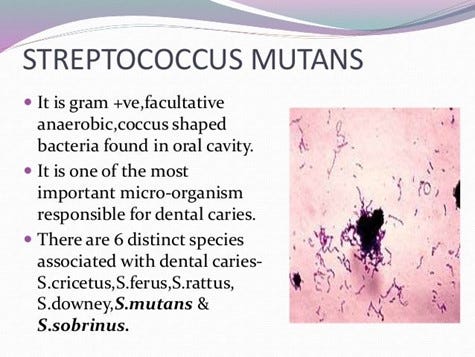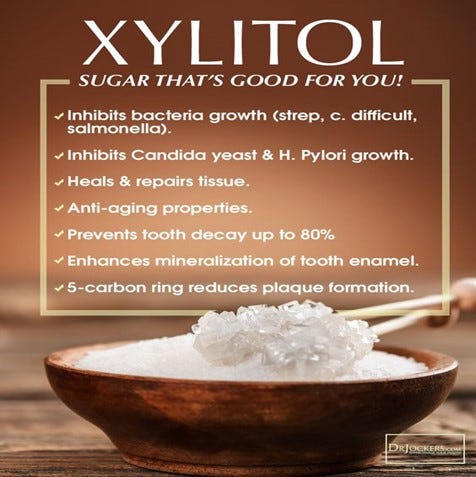We have all been told since we were children that chewing gum will lead to cavities and ruin your teeth. What if there was a gum that did just the opposite, and actually prevented cavities? Well, in this week’s article we are going to take a deep dive into this and see what gives.
What is Xylitol?
Xylitol is made from xylose, which is a crystalline type of sugar that has the curious property of not being digestible by our gut flora or microbiome. Why is that important for us? Because, if our bodies cannot break xylitol down and has difficulty absorbing it then it cannot raise our blood sugar levels.
Xylitol has 12 calories a teaspoon compared to table sugar which is 16 calories. Xylitol is poorly absorbed in the gut, and does so by passive diffusion, after which it goes to the liver where most of it is metabolized. It will cause a very small rise in plasma glucose and insulin levels.
Xylitol does occur naturally in some foods such as cauliflower, mushrooms, oats, plums, pumpkin, and strawberries, albeit in very small amounts. Xylitol is present in significant quantities in birch tree sap and corn husks.
We have been using xylitol since the 1930’s and was used extensively during the second world war as a sugar substitute in American soldier’s chow.
Xylitol is often described as a sugar alcohol since it has properties of both. However, in reality it is neither, but rather a fiber containing carbohydrate that the body has great difficulty digesting.
Xylitol is an ingredient in an amazing number of foods that we eat every day. Here is a list of some of the more common foods containing xylitol:
sugar-free chewing gum and mints
ice cream
hard sucking candies
chocolate
baked goods/desserts
table syrups
jams and jellies
cough syrup and some vitamins
nut butters
powder/granulated sugar substitutes
some supplements and nasal sprays
toothpastes and mouthwashes
Food manufacturers like it, because it is an easy add on to sweeten a food or candy without the calories or side effects of sugar. It tastes like sugar and is also relatively inexpensive to make, hence a win-win for food processing companies.
Xylitol is often touted as a “natural” sugar substitute. However, even though it is made from natural substances, it involves extensive chemical processing to produce it. Hence, for that reason I don’t consider it as a natural substitute. But who cares. Either way, this is all just semantics. We care what it can do for us, not the labels.
Kinky Fact/Nerd Food: Xylitol is toxic to dogs. If your dog ingests a product made with xylitol, you should contact your veterinarian asap. The reason for this is that dogs, unlike humans, very quickly absorb xylitol, and cause a surge of insulin released by their pancreases. This plummets blood sugar and leads to severe hypoglycemia (low blood sugar or glucose levels).
It also causes dogs to have seizures and damages their livers causing liver failure and even death if enough is ingested. Just 50 mg of xylitol per pound of your dog’s weight is the start of toxicity. To put that number in context, a single stick of sugar free chewing gum can contain one gram or one thousand mg of xylitol!
What Are Xylitol’s Health Benefits?
Diabetes and Pre-Diabetes and Overall Glycemic Control
One of the primary health benefits of substituting xylitol for table sugar is its lack of absorption as a sugar. Sugar containing foods are absorbed into the blood. Two hours later this spike in blood glucose levels is measured as “the Glycemic Index”.
Pure glucose has a glycemic index of 100, all other foods are measured in comparison to this yardstick, and are described as low, medium, or high glycemic foods. A value for a low glycemic food is less than 55, medium glycemic foods are from 56 to 69, and foods considered to be high glycemic foods are from 70 to 100.
To give you a little context, xylitol has a glycemic index of about 13, hence it is at the low end of even the low glycemic foods. The lower the glycemic index, the healthier a food is for you, since spiking blood glucose levels leads to spikes in insulin resistance.
Chronically high insulin levels cause our bodies to develop insulin resistance, meaning the insulin does not work as well as it should to drive glucose into cells. Hence, our blood sugar levels remain elevated and eventually this leads to the current scourge of mankind, diabetes.
Insulin, besides being a hormone to control blood sugar levels, is also a fat storage hormone, directing excess sugar into fat cells, causing obesity. Two great reasons to eat low glycemic index foods such as xylitol.
So, you can readily see how if you were a diabetic, there are numerous health benefits by replacing table sugar with xylitol, to better control your blood glucose levels. Replacing sugar with xylitol should be done on a 1: 1 ratio, meaning whatever amount of sugar you were using can be substituted with the same quantity of xylitol.
Dental and Oral Health
Another benefit of xylitol is in dental health, due to the fact that similar to the bacteria in the gut, the oral bacteria cannot break down xylitol. What this means is that the harmful plaque causing bacteria in our mouths such as Streptococcus mutans cannot digest xylitol for their energy needs, thus suppressing their growth and helping prevent their erosion of our tooth enamel and therefore the development of caries (cavities).
You should know that when dental plaque matures and absorbs minerals from your saliva and hardens it turns into what is known as tartar or calculus. That is the hard yellow/brown stuff the dental hygienist must chip off your teeth during a dental cleaning.
Note: Plaque is the start of a colony of bacteria like Strep. Mutans on your teeth that ultimately will result in the formation of a cavity. These colonies of plaque are what is known as biofilm, meaning that they are a living colony of bacteria that form a dome over themselves so the body cannot eradicate them.
Xylitol has an alkalizing effect on the mouth. This helps suppress many of the different types of bacteria that cause cavities, but especially Streptococcus mutans. Much of the damage done by Streptococcus mutans is from the acids it releases after digesting sugars. These acids erode tooth enamel, by making the mouth alkaline. Xylitol helps to neutralize those acids, preventing tooth decay.
Amazingly, many toothpastes and mouth washes contain sugar to make them taste better for consumers, further fueling tooth decay. Look on the labels and buy only those that contain xylitol as a sugar replacement.
Reports differ, but overall, we know that xylitol has a very positive effect on preventing tooth decay and the development of dental plaque, as well as preventing up to 80 % of cavities.
Xylitol also helps with the remineralization of teeth. This is a more controversial finding, with less documentation to support it. However, there are numerous anecdotal reports especially on places like YouTube confirming healing of cavities. In my opinion, that is a long shot, and I wouldn’t expect that to happen.
Xylitol also helps keep your breath clean and helps prevent halitosis or bad breath. The reason for that is that bad breath is the result of bacterial proliferation in the mouth. Xylitol prevents that and thus helps keep your breath nice and fresh.
Xylitol has been shown to reduce bad bacteria such as Strep. Mutans and others by from 25-75 percent, while not harming the good oral bacteria.
Xylitol can also help the intestinal absorption of calcium, helping mineralize your teeth and your bones, which is really important if you suffer with osteopenia (the stage before osteoporosis) or osteoporosis.
Ear and Sinus Infections
Xylitol’s effective suppression of bad oral bacteria helps prevent ear and sinus infections. The mouth and the throat, ears, and sinuses are all interconnected, hence reduction of the bad bacteria in the mouth has the extended benefit of preventing other infections. Xylitol also helps prevent yeast infections like oral thrush, by limiting the yeasts’ ability to stick to surfaces.
Prevention of COVID-19
A very recent surprise benefit of xylitol use is the prevention of COVID-19, as reported by a brilliant dental researcher named Dr. Mark Cannon. He found that when using xylitol, it replaces sugar that is attached to a protein on the outside of the cell. Once replaced with xylitol, the coronavirus that causes COVID-19 is no longer able to attach to the cell and penetrate it causing infection.
So, for our purposes this means that you can use xylitol containing toothpaste or mouthwash to not only prevent cavities, but also to prevent you catching COVID-19! I thought that was very cool.
Other Reported Benefits of Xylitol
Xylitol has been reported to increase the production of the most abundant protein in the body, collagen. Collagen is the primary protein in skin, bones, cartilage etc. Improving collagen production helps to heal all tissues, since they all use collagen as a structural protein.
Helping the body’s collagen therefore will have an overall antiaging effect, which is always a good thing. Don’t misunderstand me, if you have a sagging face like an old wallet, xylitol is not going to change it, but if you are middle aged and not liking some of your skin changes, xylitol could help slow it.
Xylitol has also been reported to improve gut health, since it is a soluble fiber which feeds good probiotic bacteria.
What Are the Possible Side Effects of Xylitol?
Since xylitol is a sugar substitute that cannot be digested by our gastrointestinal tract, it will add volume to the stool and may cause loose stools or diarrhea, especially if used in excess. Heavy xylitol usage can also lead to abdominal cramping, bloating, and nausea. However, most patients tolerate xylitol quite well. In fact xylitol poisoning is virtually non existent in humans.
How well do patients tolerate xylitol? In one study, patients used about 3.3 pounds of xylitol per month, averaging about 30 tablespoons daily, without any adverse effects.
As with so many substances we take, if you give your body time to adjust to it, you will fare much better, with very few side effects. Therefore, “start low and go slow”, meaning start with a low dose and slowly increase it over time. This will minimize any adverse effects.
Note: If you find yourself in a position where you’re having negative effects, you may want to use other natural sweeteners like stevia, raw honey, dates, coconut nectar, coconut sugar and maple syrup.
How the Medical Underground Uses Xylitol
Xylitol is readily available in many variations, such as gum, mouthwash, toothpaste, powdered form like sugar, also as mints, lollipops, and suckers.
Depending upon your goals, it may be used in many ways. Many parents give it to their children as a healthy gum substitute in order to prevent tooth decay, and also to minimize their ear, sinus, and throat infections.
If you are diabetic and want to use it as a sugar substitute, then that can easily be done, on a one-to-one basis. You also might want to investigate eating sweets flavored with xylitol instead of gum, for its many benefits but mostly to exploit its low glycemic index and prevent spiking of both your blood sugar (glucose) and insulin levels.
The Medical Underground strongly encourages the use of xylitol for diabetics as well as children who suffer with recurrent dental, sinus, throat, and ear infections. For weight loss, it is excellent, especially since it allows you to satisfy your “sweet tooth”, without the glucose and insulin spikes and their resulting increase in body fat.
As always, I truly hope you enjoyed this week’s article and found it both entertaining and educational. If you have friends or family that are interested in this type of content, then please by all means introduce them to the Medical Underground.
If you have not subscribed yet, then please do so, and consider becoming a paid subscriber, that will go a long way to helping me bring you this interesting content every week. A yearly subscription costs less than six dollars a month! “Cheap” as my idol Alfred E. Neuman would say. (that was a Mad Magazine reference for those of you who are too young to know him).
May God Bless You and Your Family, and the United States of America, and for those of you who believe in God remember, Miracle Shall Follow Miracle and Wonders Shall Never Cease.
This disclaimer provides that such medical information is merely information – not advice.
If users need medical advice, they should consult their doctor or other appropriate medical professional.
***Copyright © 2023 by Dr. Ralph La Guardia, MD
All rights reserved. This article or any portion thereof
may not be reproduced or used in any manner whatsoever
without the express written permission of the publisher
except for the use of brief quotations in an article review.













Thanks Jonathan, you know I really appreciate that very much.
Love your writing Dr. L. I share it with many. Great public service. This stuff should be taught in school's. Kid's don't need pronouns, they need this type of education.